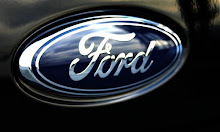Ford's Power Stroke Diesel Technology
By Anthony Fontanelle
Diesel engines have received a bad reputation in the United States due to the amount of emissions they give off. However, it seems like the wheel is indeed turning and diesel engines reputation is slowly changing as car manufacturers continually develop ways to equip their vehicles with a clean diesel engine.
One such company is the Ford Motor Company which has introduced their new Power Stroke diesel technology. This new one promises a good performance from the engine while keeping the emission level equal to that of a gasoline engine. The engine will be the workhorse of the new 2008 Ford F-Series Super Duty lineup and it already has received much praise for its fuel efficiency.
The massive 6.4-liter Power Stroke diesel engine has an improved performance over the previous diesel engines employed by Ford. The technology also reduces emissions and NVH or noise, vibration, and harshness. The high performance of the engine and its low emission are two things to like about it. But it is also important to keep in mind that this engine also has 25 to 30 percent better fuel economy rating than gasoline engines. In fact, the newer generation of clean diesel engines is taking over the European market and Ford hopes to do the same in North America. Ford hopes to launch the technology successfully since a large number of Super Duty buyers opt for a diesel engine under its hood.
One great thing about the engine is that it exhibits no turbo lag and according to Richard Truett, engineering reporter for Automotive News, I have never felt that performance out of a diesel before. This he stated after going 60 to 65 miles per hour while towing. He further said that he cant find anything to dislike about it (the engine). His rave review of the technology is shared by John Stewart, editorial director of Diesel World Magazine: Its a tremendously quiet engine. It has torque everywhere you look. The technology that they have brought to bear is the latest in the field. When you drive it you think, this thing is a great cruiser. We need to go on a trip with this.
The people at Ford said that the Power Stroke diesel is the companys cleanest and quietest pickup diesel ever. Its particulate emission, which in the past has given it a bad reputation, is reduced to almost the equivalent of gasoline engine emissions. It gives that clean emission while giving out 350 horsepower that would take a high performance disc brake and an EBC brake rotor to efficiently stop the vehicle. The engine also provides 650 lb-ft of torque at 2,000 revs per minute with the help of its two-stage turbocharger. The Power Stroke engine is the first pickup engine in the US to feature the common rail fuel injection system with piezo-electric injectors.
The development of the diesel engine was made possible with the help of Fords European connection. Power Stroke diesel Manager Enio Gomes stated that they have tapped the knowledge of the companys European diesel experts in order to integrate the cutting edge technologies in the new engine especially the fuel injection system stated earlier. Another part that the European diesel engines experts help integrate in the new diesel engine is the particulate filter that significantly reduces the amount of emissions being released by the engine.
Ford is counting on their new diesel technology to propel the company to the top of the diesel engine equipped vehicle market which is expected to increase significantly in the next couple of decades. In fact, they have already revealed their plan of offering a Ford F-150 equipped with a diesel engine which will be another first for the companys light-duty pickup series.
Anthony Fontanelle is a 35-year-old automotive.buff who grew up in the Windy City. He does freelance work for an automotive magazine when he is not busy customizing cars in his shop. You can visit EBC brake rotor for more information.
Article Source: http://EzineArticles.com/?expert=AnthonyFontanelle
http://EzineArticles.com/?Fords-Power-Stroke-Diesel-Technology&id=446469

0 comments:
Post a Comment